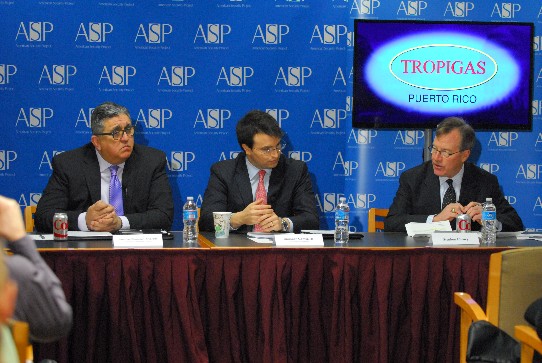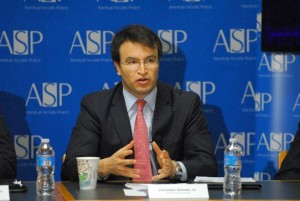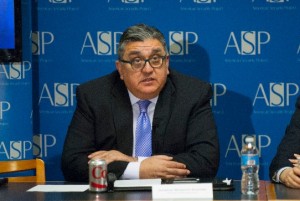 Panel 1- Dr. Jonathan Benjamin-Alvarado (left), Christian Gomez, Jr. (middle), B
Panel 1- Dr. Jonathan Benjamin-Alvarado (left), Christian Gomez, Jr. (middle), B
Caribbean Energy Security Conference- Panel 1 Review
Podcast: Play in new window | Download
Subscribe: Apple Podcasts | RSS
The American Security Project hosted a half-day conference on Wednesday, February 4th examining energy security in the Caribbean. Nearly 100 experts from academia, International Financial Institutions, the US government, the media, and private corporations attended the conference which consisted of three panels. These panels discussed the current geopolitical landscape of the Caribbean, policy challenges posed to the region, and potential solutions to alleviate dependence on fossil fuels.
Introductory remarks were offered by Andrew Holland, ASP’s Senior Fellow for Energy and Climate. He gave a brief overview of the Caribbean’s current energy situation and emphasized the importance of the recent American energy revolution and its role in reducing energy dependence in the region by providing affordable, available alternatives.
The panel was chaired by BGen Stephen Cheney, USMC(Ret), CEO of the American Security Project.
The first panel examined the complex overlap of geopolitics and the  economics in the Caribbean. The panelists discussed the impact of falling oil prices, Venezuela’s spiraling economy, and Cuba’s potential role in the region moving forward. The panelists began by laying out just how dire the energy situation is in the Caribbean. Prosperity in the region is almost entirely dependent upon outsiders, with some islands importing as much as 99% of their total energy. They then went on to discuss the effect of declining oil prices on the Petrocaribe program, an oil partnership between Venezuela and numerous Caribbean states. Declining oil prices have greatly affected Venezuela, where oil and gas account for roughly 25% of the country’s GDP. Christian Gómez (Council of the Americas) described the situation in Venezuela as “precarious,” arguing that fall of the Petrocaribe program would have adverse effects on its Caribbean partner countries.
economics in the Caribbean. The panelists discussed the impact of falling oil prices, Venezuela’s spiraling economy, and Cuba’s potential role in the region moving forward. The panelists began by laying out just how dire the energy situation is in the Caribbean. Prosperity in the region is almost entirely dependent upon outsiders, with some islands importing as much as 99% of their total energy. They then went on to discuss the effect of declining oil prices on the Petrocaribe program, an oil partnership between Venezuela and numerous Caribbean states. Declining oil prices have greatly affected Venezuela, where oil and gas account for roughly 25% of the country’s GDP. Christian Gómez (Council of the Americas) described the situation in Venezuela as “precarious,” arguing that fall of the Petrocaribe program would have adverse effects on its Caribbean partner countries.
 Cuba’s potential role in the region was also featuredin the first panel. Dr. Jonathan Benjamin-Alvarado (University of Nebraska Omaha) discussed Cuba’s preparedness for alternative energy and emphasized the need for the country’s access to financial institutions to break from dependence on oil imports, 50% of which come from Venezuela.
Cuba’s potential role in the region was also featuredin the first panel. Dr. Jonathan Benjamin-Alvarado (University of Nebraska Omaha) discussed Cuba’s preparedness for alternative energy and emphasized the need for the country’s access to financial institutions to break from dependence on oil imports, 50% of which come from Venezuela.
Concerning US relations with Cuba, Dr. Benjamin-Alvarado was optimistic. Removing the embargo is the first step, he argues, in normalizing economic relations between the two countries in terms of funding and partnerships. On Cuba’s potential, he was clear:
“Economically, Cuba is a monster. It has the potential to be a true, regional juggernaut.”
Special thanks to Tropigas for generously sponsoring this event.
View the other Panel reviews below:






[…] Panel 1 […]
[…] Panel 1 […]
[…] Caribbean Energy Security Conference- Panel 1 Review […]
Peerless Oil & Chemicals located in Puerto Rico has interest in the Caribbean and would appreciate a copy of any published information regarding your Feb 4th meeting.
Thank you and best regards,
Ed Carey (516) 965-9580
[…] there are several national security considerations. Caribbean islands like Puerto Rico are high traffic trans-shipment points for drugs and human […]
[…] and audio is available through the report and on our website. ASP intends to further examine the options for improving energy security throughout the […]